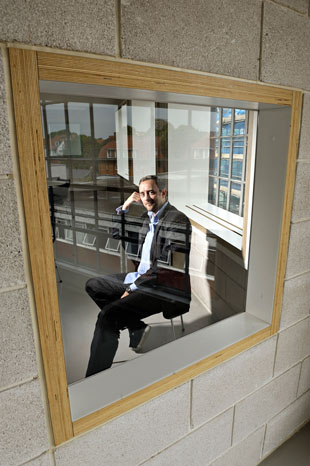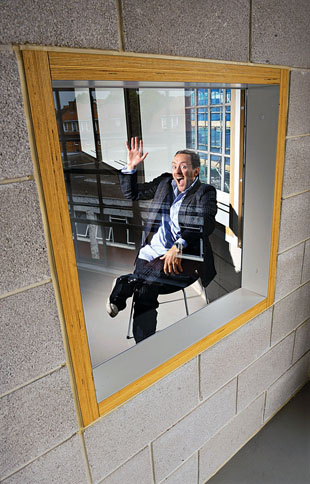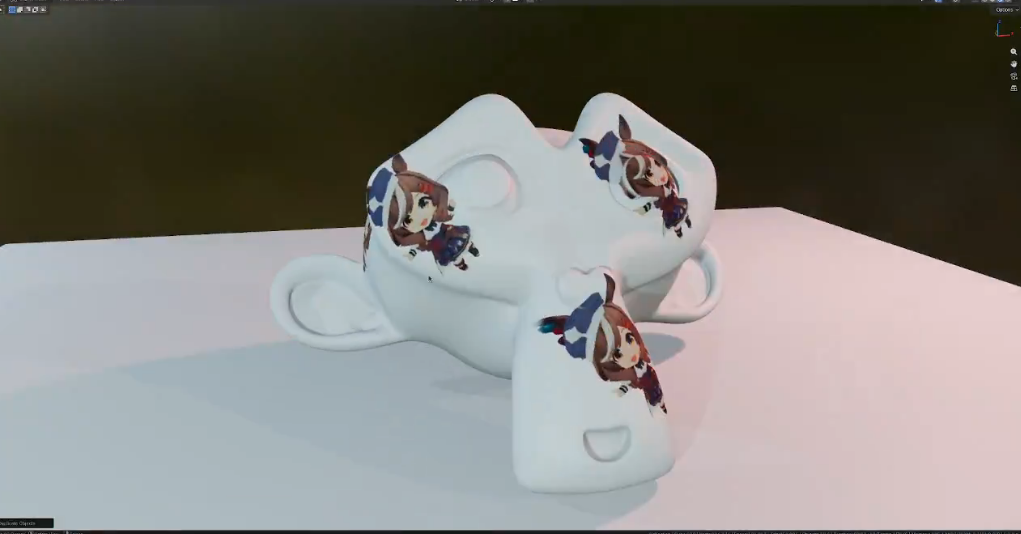Simon Waterfall
Award-winning digital agency Poke is pushing the boundaries of the developer-client relationship. Simon Waterfall, co-founder and creative director, chats to Oliver Lindberg and reveals what makes Poke’s way of working so different
Sign up to Creative Bloq's daily newsletter, which brings you the latest news and inspiration from the worlds of art, design and technology.
You are now subscribed
Your newsletter sign-up was successful
Want to add more newsletters?

Five times a week
CreativeBloq
Sign up to Creative Bloq's daily newsletter, which brings you the latest news and inspiration from the worlds of art, design and technology.

Once a week
By Design
Sign up to Creative Bloq's daily newsletter, which brings you the latest news and inspiration from the worlds of art, design and technology.

Once a week
State of the Art
Sign up to Creative Bloq's daily newsletter, which brings you the latest news and inspiration from the worlds of art, design and technology.

Seasonal (around events)
Brand Impact Awards
Sign up to Creative Bloq's daily newsletter, which brings you the latest news and inspiration from the worlds of art, design and technology.
It’s certainly a unique working environment. You take the lift and arrive right in the middle of Poke’s office in the Biscuit Building, an old-school industrial warehouse in Shoreditch, London. Almost everything at Poke is white: the walls, the tables, the window frames, the computers (Macs, of course). A large pivoting glass panel door leads to the boardroom, which is fitted with a huge elliptical table, completely made of wood. Moving wooden shapes over it changes the colours in the 100 lightbulb-strong interactive installation, designed by Jason Bruges, that hangs above.
A long ‘project’ wall in the main creative studio is covered in printouts. This is where the small teams that work on Poke’s projects display their work and discuss it with each other. That is to say with each other and with the client, who becomes part of the team and moves in during the project.
Only four people make a good project: you, the developer, the account handler and the client
“Only four people make a good project,” explains Simon Waterfall, creative director and co-founder of Poke, “You, the developer, the account handler and the client. We think about what we can make together, what we can make that’s new. When the clients come to us, they know of our reputation and that we’re a very challenging bunch to work with. They’re really saying ‘Let’s make it together’. There aren’t many clients that want to do it. It’s hard work”.
In fact, Poke is in a position where it turns down a lot of work (some it forwards to people they think might be better suited to it, some is simply not right for them) and doesn’t even have to pitch actively. “We don’t churn out stuff that won’t make or enhance the experience, which can be difficult for brands that are trying to hire us to get around. We don’t pitch very often, if at all. We choose our clients and work like architects. We always try and challenge what we can do. Poke is an internally aggressive company.”
That’s why, when Poke does pitch, the agency asks to speak to the client’s legal team first because it’s the biggest bottleneck. “They need to be educated before you start any design, and it’s up to us; it’s our responsibility to shape these clients.”

So when Poke worked with BBC Worldwide recently, somebody from the Beeb was ever-present. “They had the office here to sit with us, eat with us and go drinking with us,” Simon says. “They’re there for every meeting, they make the tea, I make the tea and everyone makes the tea. The clients get an understanding of why we make decisions. It helps keep everybody in the same headspace and have the same personal love for the project that you’re working on.
“It’s great for the studio because rather than hearing Chinese whispers about problems through an account handler or a director, you just sit down and have lunch with the client. If they ask why something is below the fold, for instance, you can simply discuss it in an informal manner and show it to the client after the meal. This avoids tons of useless emails and meetings.”
Sign up to Creative Bloq's daily newsletter, which brings you the latest news and inspiration from the worlds of art, design and technology.
Lunch, it becomes apparent, isn’t just lunch at Poke. It’s crucial for the way Poke works: everybody eats together. “A company that eats together, stays together, because you sort out more problems over a coffee than you do sending 300 flaming emails.”
And every four months all 55 employees get up in the studio and move to a new desk. “Because you sit next to somebody new, you sit next to a different skill set or age group. It stops you becoming so introverted that you don’t accept the new. It’s not a gimmick, it helps. And once you have this very studio-based environment, it’s a great way to be inspired all the time.”
Freelance future
The freelance army is very underrated and we really respect everybody that comes through the door because they challenge what we can do
The culture at Poke is very collaborative. Lots of other digital agencies, advertising and branding houses are involved in its projects. And then there are the freelancers. “There’s an enormous rise of the freelance army,” Simon says. “There’s some amazing freelance people and it means you can employ a specialist for a certain amount of time and you don’t have to do the research and learn it yourself. The freelance army is very underrated and we really respect everybody that comes through the door because they challenge what we can do. You just have to make sure you don’t use and abuse them and you give them enough credit, which is not the way that freelancers were used in the past, which I think was quite nave. An individual project is great but a client who has the understanding, who is actively participating with us, the freelancers and other agencies to make us better – that’s my idea, that’s why I get up in the morning.”
Simon Waterfall, who last year became D&AD’s first digital president, co-founded Poke shortly after his company Deepend went bust in 2001. It had been the UK’s leading web design agency for three years, but then suddenly went under. Simon even signed on for a few months. Then he sat down with some of the directors from Deepend (Peter Beech, Nick Farnhill and Tom Hostler) and Oven Digital (Nicolas Roope and Iain Tait). “We decided we never wanted to repeat ourselves. We don’t want to do what we did, we don’t want to work for the same people, we don’t want to do the same type of work.” Hence the name: repeat yourself and you risk being poked by your colleagues.

Today Poke deals with brands like Topshop, Orange, Lego and Alexander McQueen, has won numerous awards and last year opened its first overseas office in New York. Simon is confident his agency will survive this time. “I’ve lived through recessions, I died in recessions,” he explains. “This one’s different because it’s an overinflation not of our marketplace, it’s of oil prices and consumption as a whole. It’s a reality check, because we learn every time a boom goes bust. When recession hits, people cut down on traditional marketing because of the risk attached.
They only do the appropriate marketing, and digital is absolutely trackable to the click. We’ll all be busier in a recession because the risk is reduced. You’re selling a service, a product; you’re everywhere and your shop is never shut."
It was also agreed not to let Poke turn into a huge company (Deepend had 350 employees) and to focus on the creative work rather than on travelling around the world and managing people. Each partner runs about two and a half big clients and projects and much of the work involves ‘web plus’. “I haven’t done any lone websites for a long time, maybe three or four years. It’s always web plus PR or web plus advertising. It’s not just us as a little microcosm.”
New projects
Poke’s latest project is promoting Motorola’s new ROKR E8 phone. Poke teamed up with dancing YouTube superstar David Elsewhere and asked him to interpret the phone’s features through dance. Add music by German electronic artists Modeselektor featuring Puppetmastaz and you’ve got a surefire viral that appeals to a huge audience. It’s even got its own YouTube channel. “People don’t buy the phone on features, so how do you differentiate it?” Simon asks. “We took two things that were huge, and they make you interested. That music is fucking better than the phone, and all three together create interest. We didn’t make an advert about the phone, the phone enabled this content to be made.”
All the while Simon Waterfall, who designs his own fashion brand, Social Suicide, and used to be known for his penchant for wearing skirts, remains grounded. “We’re not artists, we’re designers,” he explains. “We work for other people. Brands pay us to do work and we have to understand the brands and the constraints.” There’s no shortage of brands that would like to work with Poke. It’s one of the most acclaimed agencies in the country. And so, unlike Deepend, Poke is here to stay.

The Creative Bloq team is made up of a group of art and design enthusiasts, and has changed and evolved since Creative Bloq began back in 2012. The current website team consists of eight full-time members of staff: Editor Georgia Coggan, Deputy Editor Rosie Hilder, Ecommerce Editor Beren Neale, Senior News Editor Daniel Piper, Editor, Digital Art and 3D Ian Dean, Tech Reviews Editor Erlingur Einarsson, Ecommerce Writer Beth Nicholls and Staff Writer Natalie Fear, as well as a roster of freelancers from around the world. The ImagineFX magazine team also pitch in, ensuring that content from leading digital art publication ImagineFX is represented on Creative Bloq.
